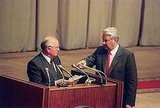Congratulations, Mikhail Sergeyevich!

Today is the 75th year birthday of former Soviet leader Mikhail Gorbachev. There will be some sort of celebration this evening in a Moscow restaurant, with Helmut Kohl as one of the more personal guests.
There is every reason to congratulate Mikhail Sergeyevich on his anniversary. He certainly is one of the great figures in Soviet history, although perhaps somewhat less so in the Russian equivalent.
I have to confess that I belong to the few that have been somewhat less admiring of his political greatness than most others. I think his greatness is essentially a function of him not understanding what he was doing and what was happening.
No previous Soviet leader had suffered from the illusion that their state and empire could be preserved and held together without the use of brutal force now and then.
Lenin abolished the Duma that had been elected in early 1918 and proceeded with a brutal civil war that set up the state. Stalin not only carried forward the repression and brutality but brought it to levels hitherto very seldom seen in history.
And while Chrustjechev certainly denouned Stalin for his crimes in his famous secret speech in early 1956, it did not take many months until he sent the Soviet tanks rolling into Budapest. Twelwe years later, Bresjnev repeated the procedure against Czechoslovakia in 1968. His successor Andropov threathened the Poles with invasion if they did not introduce martial law themselves against the Solidarnosc trade union movement, and having served in the Soviet Embassy in Budapest in 1956 he knew what he was talking about.
The truly historic decision that Gorbachev took was that the system and the empire should not be defended by force.
It was a decision based on a misunderstanding. It seems as if Gorbachev genuinely believed that the Soviet system could be given a new life with some more transparency and some more reforms. Ironically, the fact that he had never served in any more central position in the Kremlin or the Central Committee apparatus might have made him a victim of Soviet propaganda.
AS things started to deterioate, Gorbachev mostly stayed with his principle of not using force. Instead, each situation was handled with a small retreat in the belief that this was the last and the reforms would then turn everything around and a modern and better Soviet Union will emerge.
But no such thing happened. One demand for change instead gave way for another. There was no half-way house when issues of freedom and national independence were suddenly raised. With the spectre of the tanks gone, the dissolution of the Soviet system began to look like an avalanche.
There were - this is part of the picture - exceptions.
Early in his period as General Secretary of the Soviet Communist Party he presided over using troops to brutally break up demonstrations in Tblisi in Georgia.
And it is clear that the attempt to use military force to turn the clock back in the Baltic republics in early 1991 was sanctioned and lead by so high authorities in Moscow that is seems incredible that Gorbachev in the one way or the other was not involved. I remember seeing him in Stockholm a few months after this operation failed - and he blamed everything that had happened on "fascists" in Lithuania that were trying to destroy the Soviet Union.
It was in Germany everything could have gone very wrong. But as the wall in Berlin was opened, the Group of Soviet Forces in Germany around the city held their tanks in their halls under order from Moscow.
Helmut Kohl had managed to establish a relationship of thrust with Gorbachev, and it worked. Later, Gorbachev had to accept what was the unavoidable consequence of the decison not to send in the tanks in the form of the disappearence of the GDR and the reunification of Germany within the European Union and NATO.
On the domestic scene, his failure on the economic side meant that the country went into an economic, social and political tailspin. The attempt in August 1991 to unseat him through a military coup failed, but after that he was effectively gone, although he did not resign until late December of that year.
Then it was Boris Yeltsin who took over. He knew what he was doing. He had previously been thrown out by Gorbachev for advocating too radical reforms. He forced the recognition of the independence of the Baltic countries, the banning of the Communist Party and the dissolution of the Soviet Union. He called in the radical reformers that turned the failing economy around, brought food back to the shops and gave a new hope for a new Russia.
But that's another story that I will have reason to return to in the connection with another birthday in Moscow in the next few weeks.
In the meantime we congratulate Mikhail Sergeyevich as the man whose misunderstanding gave us the peaceful dissolution of the Evil Empire.



<< Home